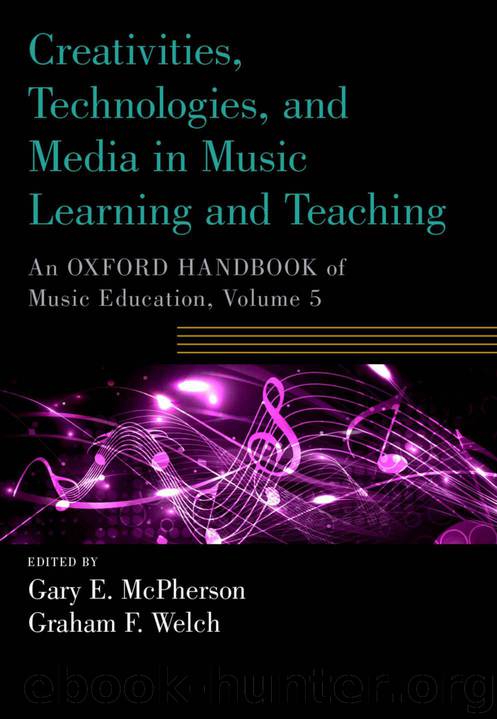Creativities, Technologies, and Media in Music Learning and Teaching (Oxford Handbooks) by Gary E. McPherson & Graham F. Welch

Author:Gary E. McPherson & Graham F. Welch
Language: eng
Format: azw3
ISBN: 9780190674564
Publisher: Oxford University Press
Published: 2018-05-03T06:00:00+00:00
CONCLUSION
The very last exemplar regarding technology and music education is offered as an anecdote. Whilst presenting research findings at an international conference focusing on the singing voice and singing pedagogy (see also “Visualizations: Intent and Moral Practice,” above), this author, as part of a research team, was confronted by an established, elderly (and known to be “highly old-fashioned’) pedagogue who felt that it was preposterous to use a side-view video camera in the singing studio for monitoring the singer’s posture (whilst displaying this live view to the singer as real-time feedback). The passionate pedagogue appeared to have had reached his listening “thresholds” with “all those young researchers telling people what to do” and, presumably, disturbing the perfect equilibrium that was their teaching of singing. His argument was that he “did not need all that technological mumbo jumbo,” he had been doing that same thing using a long mirror for all his practising life. The pedagogue’s levels of infuriation subsequently led him to leave the auditorium when this author demonstrated that, by using a glass mirror, he truly was a cutting-edge music technologist (see table 8.1).
The timeline of the musicking humanity (see fig. 8.1) that was offered at the beginning of this chapter should not be seen as this author’s nihilistic view of the role of technology in music and music education. On the contrary, it should be regarded as a pragmatic portrayal of our trajectory, as inherently musical beings, through fascinating times of continual technological development. Furthermore, the real-world research exemplars provided, it is hoped, have demonstrated that music technology is not (and should not) be perceived as a set of ephemeral tools whose use a music educator should master in order to survive in an utterly competitive, ever evolving, highly paced, and constantly demanding educational and living environment; an environment that demands a dichotomy between digital natives and digital immigrants (see also Savage, chapter 11). The fact that almost all recorded “technologies” that have been presented in the musicking humanity’s timeline form only a minuscule part of humanity’s musical life span supports an argument that our focus should always be on music. It would be frivolous to deny that we live in a time of rapid technological development. Surely, homo habilis had to experience music in a far less “technologically rich” environment than homo guitar hero. Technology has enabled us—and is constantly enabling us further—to challenge the world, challenge certainties, increase awareness, shape attitudes, and foster communication. In addition, technology is not something that we can decide to become estranged from; it is part of our human condition. Some researchers might suggest that not only humans can use tools, but—almost certainly—only humans can be critical about the effective use of these tools. This needs to be celebrated, in harmony with our other basic human condition of being musical.
Download
This site does not store any files on its server. We only index and link to content provided by other sites. Please contact the content providers to delete copyright contents if any and email us, we'll remove relevant links or contents immediately.
Periodization Training for Sports by Tudor Bompa(7371)
The MacArthur Bible Commentary by John MacArthur(4272)
The Body: A Guide for Occupants by Bill Bryson(3877)
The Sports Rules Book by Human Kinetics(3626)
What It Really Takes to Get Into Ivy League and Other Highly Selective Colleges by Hughes Chuck(3241)
Marijuana Grower's Handbook by Ed Rosenthal(3150)
The Sprouting Book by Ann Wigmore(3076)
Salt, Fat, Acid, Heat: Mastering the Elements of Good Cooking by Nosrat Samin(2683)
The Martian by Andy Weir(2646)
Classic by Mary Berry(2525)
The Bread Bible by Rose Levy Beranbaum(2501)
Harry Potter 4 - Harry Potter and The Goblet of Fire by J.K.Rowling(2444)
Sapiens and Homo Deus by Yuval Noah Harari(2443)
The Marketing Plan Handbook: Develop Big-Picture Marketing Plans for Pennies on the Dollar by Robert W. Bly(2434)
Martha Stewart's Baking Handbook by Martha Stewart(2355)
Screenplay: The Foundations of Screenwriting by Syd Field(2086)
50 Economics Classics by Tom Butler-Bowdon(2081)
The Plant Paradox by Dr. Steven R. Gundry M.D(2066)
The Cambridge Grammar Of The English Language by Rodney Huddleston Geoffrey K. Pullum(2065)
